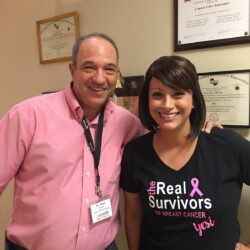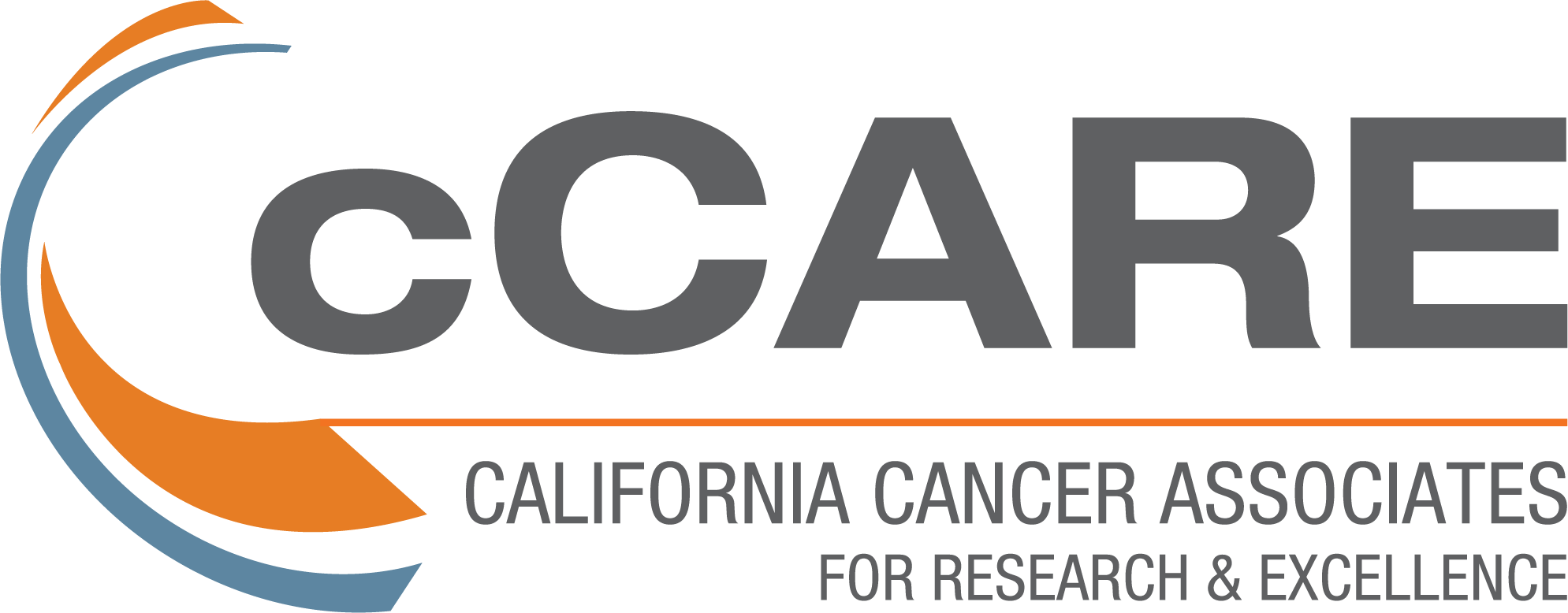Yesenia, pictured with Dr. Steven Hager, also learned the answers for her were not easy. But she never stopped moving forward and now she’s moving on.

Things moved very quickly for Yesenia. On February 11, she discovered a lump in her breast. By March 31, she had had a mammogram, ultrasounds, biopsy and was diagnosed with stage 2B breast cancer. April 6 she was being wheeled back into a surgery room to have a full mastectomy.
In just two months, Yesenia’s everyday life went from normal to battling breast cancer, working full time and raising two kids.
“I wasn’t in shock. I wasn’t scared,” she remembers. “I was just like, Okay. What’s the next step? How do we move forward?”
Yesenia’s Hispanic heritage and family history of breast cancer, on her father’s side, all contributed to the fast-paced nature of her treatment. According to the National Institutes of Health, breast cancer is the leading cause of cancer death in Hispanic women. At the time of her diagnosis, she went through genetic testing, which determined that she had the BRCA2 gene mutation.
Stage 2B breast cancer is categorized as cancer that is growing but contained to the breast. Yesenia had very little time after her diagnosis to determine if she would have a lumpectomy or a more aggressive mastectomy to remove the 5 cm tumor. Ultimately, she moved forward with the mastectomy.
“Going into it, I knew that it was one step at a time,” says Yesenia. “You can’t let it beat you. You have to beat it.”
Have questions about breast cancer?
Dr. Hager’s comfort included addressing Mom’s cancer conspiracy theory
Yesenia was referred to cCARE to see Dr. Steven Hager and continue treatment after her mastectomy.
“My first impression of him was that he was a very compassionate person,” Yesenia recalls. “He took the time to explain everything.”
Dr. Hager’s willingness to spend time with her comforted Yesenia and her mother, who was very involved in her daughter’s cancer journey. Yesenia remembers that Dr. Hager took the time to answer all the questions she and her mother had no matter what they were.
“It sounds silly, but my mother had this conspiracy theory that if I microwaved food it would affect my cancer. It was laughable, but he took the time to answer it.”
He had a good laugh about this idea but did tell Yesenia’s mother this was not something to be concerned about. His approach to patient care helped reassure Yesenia, and her mother, that she was in the right place.
At cCARE, she didn’t feel like she was just another patient in Dr. Hager’s schedule. He not only spent time on her questions but also genuinely wanted to know about her life. He remembered that she had planned a trip to Portland and asked her about it at her next appointment. Despite his own full schedule, Yesenia never felt rushed.
“He’s a very good doctor,” she says. “I’m lucky to have him.”
After surgery, Yesenia’s real struggle with breast cancer began
“The surgery was a cakewalk compared to radiation,” she recalls. “That’s what really kicked my butt because I was working.”
Yesenia’s days would begin by driving 30-45 minutes, in the early morning hours, to receive radiation. She would then get to work by 8 a.m. and work a full day. This packed schedule left Yesenia drained every day but also left her with little time to worry about cancer.
“It was fast-paced and I probably wouldn’t have wanted it any other way,” she says. “Don’t stop. Because once you stop, you’re going to sit down, soak it all in and freak out.”
While Yesenia understands it helps some cancer patients to dive into the breast cancer community, that was not what she needed.
“I didn’t want to just think about it and have it consume my life to where it was all pink ribbons,” Yesenia says. “I was like, It is what it is. What’s the next step?”
Get by with a little help from friends and family
Yesenia was not alone on her cancer journey. A co-worker had recently gone through the same, exact diagnosis. Because she had been down the same road as Yesenia, she helped immensely.
“She really guided me through the process,” Yesenia recalls.
But she also introduced Yesenia to another woman who was receiving treatment at cCARE for breast cancer under the care of Dr. Hager. These friendships built around these difficult diagnoses were instrumental in Yesenia’s cancer journey.
Her mother, sister, brother and boyfriend all pitched in to help. From taking her two kids to school to cooking for her and the kids, they were there when needed, and Yesenia believes she couldn’t have done it without them.
“My family’s support was key,” she says. “They took the stress off of me as much as they could.”
Making and ringing the bell
After completing treatment, mastectomy, radiation and chemotherapy, Yesenia could see the light at the end of the tunnel. She remembers seeing YouTube videos of people ringing a bell once they complete cancer treatment. This stuck in her mind, but she noticed that her cCARE location did not have a bell.
To correct this problem, Yesenia, her father and boyfriend made a bell and donated it to cCARE. The bell moved to cCARE’s new Fresno location to help patients there celebrate the completion of their treatment. While she was the first one to ring the bell, Yesenia says seeing others ring it makes her more emotional than thinking of her own cancer experience.
“I know exactly what they are feeling when they ring the bell,” she says. “Like, finally you’re done.”
Focusing on what’s next, not what’s left
While she was done with the intense treatments, Yesenia was still undergoing hormone therapy. She struggled immensely with the medication and remembers this is when her open communication with Dr. Hager was crucial.
“You have to have trust in your oncologist that he knows what’s best for you, but that he also listens to your concerns,” she advises.
Dr. Hager listened to Yesenia’s concerns and worked with her to find a solution. She changed medications and has had no problems since. Yesenia felt that it was so important that he understood and was willing to change plans, rather than simply follow the book.
For the first time since she found the lump in February, Yesenia had a moment to stop after her treatment. Yesenia at first thought she could go back to her life before. She soon learned this was not going to happen.
“I didn’t look like myself. I didn’t feel like myself,” she says. “I no longer identified as that person. You have to learn how to rebuild.”
She found her new normal through the help of a support group. Despite at first being hesitant of support groups, Yesenia found friendship and community with the women there.
Yesenia encourages others going through cancer treatment to take it one day at a time and not get overwhelmed by the bigger picture.
“Take it one infusion at a time and don’t focus on how many you have left,” she says. “Finishing is the ultimate goal.”
